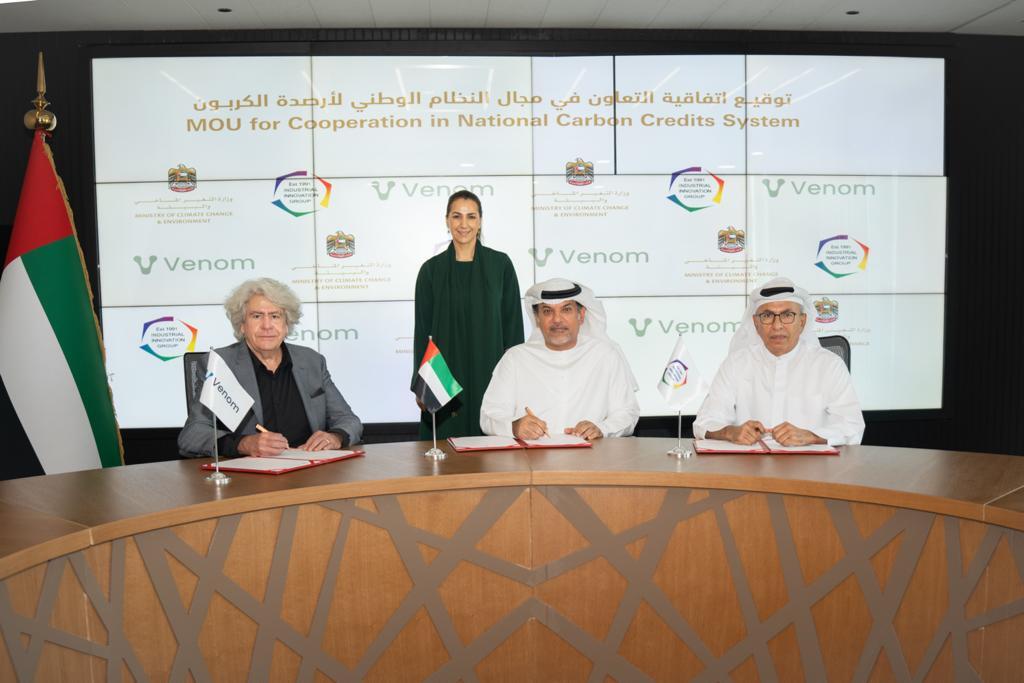The UAE Ministry of Climate Change and Environment (MoCCAE), along with the Industrial Innovation Group LLC and Venom Foundation, has entered into a Memorandum of Understanding (MoU) to create a pioneering national carbon credit system using blockchain technology.
Witnessed by Mariam bint Mohammed Almheiri, Minister of Climate Change and Environment, the MoU’s objective is to establish a groundbreaking collaboration aimed at lowering emissions and bolstering sustainable agriculture, environmental well-being, and biodiversity within the UAE.
This initiative will deliver the utmost transparency, dependability, efficiency, and security in managing the issuance, transfer, calculation, and precise monitoring of carbon credits. It will also facilitate the process of digitization, according to Gulf Business.
At the MoCCAE office in Dubai, the MoU was signed by Mohammed Said Al Nuaimi, acting under-secretary of MoCCAE, Taryam Matar Taryam, CEO of Industrial Innovation Group, and Peter Knez, chair of the Foundation Council at Venom Foundation.
Almheiri said, “As the UAE prepares to host COP28 in November, the country is striving to double its efforts and showcase its inspiring experience to the world in addressing climate change by reducing carbon emissions across different sectors. The UAE believes in its ability to make a difference in this field and has pledged, through the Third Update of its second Nationally Determined Contributions (NDCs), to reduce its emissions by 40 percent compared to a business-as-usual scenario, an increase of 9 percent over its previous pledge.”
She added, “This requires working according to a scientific approach based on modern technology and the highest levels of transparency to monitor carbon credits to work according to realistic data, achieve tangible results on the ground, and achieve climate neutrality by 2050.”
Scope of the MoU’s Impact
“The collaboration with the Industrial Innovation Group and Venom Foundation to establish the national system for carbon credits using blockchain is an important step in this field and reflects our determination to enhance the UAE’s climate action for a more sustainable future for us and future generations.”
The MoU has set out four key objectives to address greenhouse gas emissions, promote sustainable agriculture and responsible investment, enhance the Environmental Health Programme’s economic value, and conserve biodiversity for sustainable development.
The primary collaboration areas among the three entities include devising strategies and technological solutions for a UAE-based global carbon credit registration platform. This initiative aligns with government decisions related to the national carbon credit system. A blockchain-based solution will be created to manage carbon credit issuance and registration, along with identifying projects for emissions reduction.
The collaboration aims to establish a legislative framework for the issuance and registration of carbon credits. This involves developing a licensed platform and utilizing blockchain to ensure secure and efficient carbon credit document production. The partnership also involves system integration to meet operational requirements, project evaluation for emissions reduction, and transparency in the process.
Alignment with Global Commitments and Development Goals
The MoU encompasses diverse sectors such as agricultural investment, innovative agrarian technologies, food industry investment, food safety practices, beekeeping, aquaculture, and more. It also encompasses areas like plant and animal quarantine regulations, trade facilitation, energy efficiency, green technology management, and biodiversity protection.
Taryam Matar Taryam, CEO of Industrial Innovation Group, expressed commitment to sustainable development goals and carbon reduction efforts, noting the group’s history in creating large-scale records for different sectors.
Peter Knez, chair of the Foundation Council at Venom Foundation, highlighted their contribution to a global Web3 ecosystem and blockchain technology licensing, positioning them at the forefront of national decentralization efforts.
The agreement aligns with international commitments, environmental legislation implementation, circular and green economies, food security enhancement, technological development, and employee capacity evaluation.


